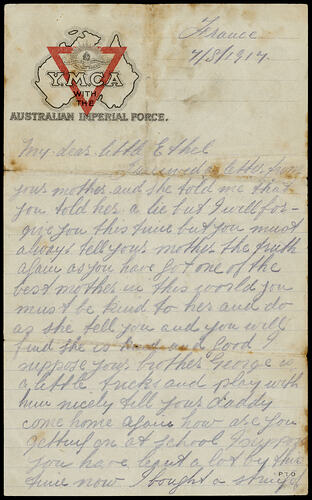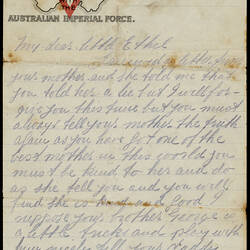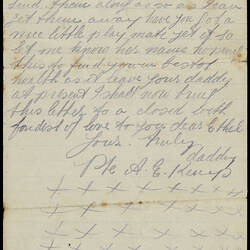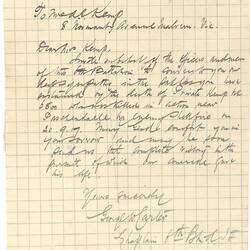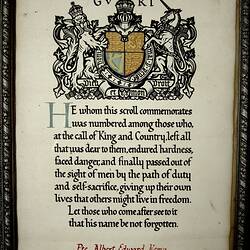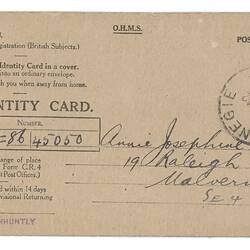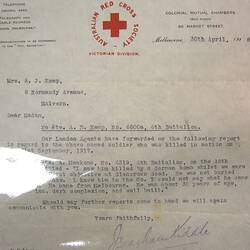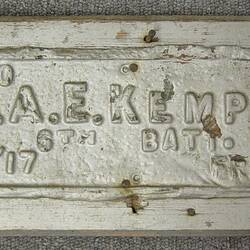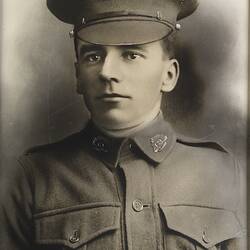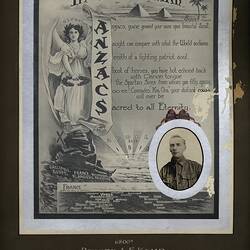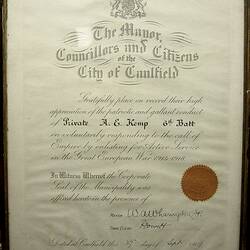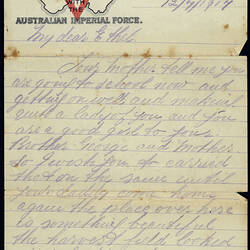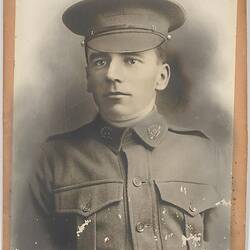Summary
Letter to six-year-old Ethel Kemp from her father Private Albert Edward Kemp, who was serving on the Western Front during World War I. He was killed six weeks later, on 21 September 1917. His body was never found.
Albert tells his 'Dear little Ethel' that he received a letter from her mother saying that Ethel had told a lie. He forgives her 'this time', but admonishes her to 'always tell your mother the truth again as you have got one of the best mothers in this world / you must be kind to her and do as she tell you and you will find she is kind and good'. He instructs her to play 'nicely' with her brother George 'till your daddy come home again'. He asks how she is getting on at school and supposes she has 'learnt a lot by this time'. He tells her he has bought her a string of Rosary beads, and asks for the name of her 'nice little play mate'. He hopes to find her 'in the best of health as it leave your daddy at present', and closes with 'fondest of love to you dear Ethel'. He concludes: 'Please give a kiss for mother and George for me with a safe return with God Almighty Lord help.'
Physical Description
Letter written on lined paper with purple pencil. Paper is yellowed and foxed. Upper left features outline of Australia traced with black line, overlaid with red triangle and words 'Y.M.C.A./WITH/THE/AUSTRALIAN IMPERIAL FORCE'. The rising sun logo for the Australian Commonwealth Military Forces appears above text.
Significance
Albert Edward Kemp was a 32-year-old butcher, living at 8 Normanby Ave, Caulfield and married to Annie Josephine, when he enlisted. Born in South Yarra, he was a small man, 5'4½", and weighed only eight stone. He and Annie had a daughter, Ethel Mavis, and a son, George Percival. Albert enlisted at Royal Park on 4 October 1916, and was assigned to the 22nd Reinforcements, 6th Battalion - regimental number 6800. His battalion left Melbourne 25 October 1916 - just 21 days after Albert enlisted - on the 'Ulysses' with two officers and 150 O/Rs. The ship arrived in Plymouth three days after Christmas.
A little over one month later, on 1 February 1917, Albert was disciplined for being absent without leave from midnight and was apprehended the next afternoon. He forfeited 18 days' pay for his offence. He was shipped to France on 27 March, and probably went into action in the trenches. On 13 July Albert was again in trouble, this time for disobeying orders from a superior officer. (It is unclear what his punishment was, but "48 hours" may refer to imprisonment). Two months later, on 21 September 1917, Albert died in the trenches in Glencorse Wood, Belgium. He is buried at 29 The Ypres (Menin Gate) Memorial, Belgium. His name is located at panel 47 in the Commomorative Area at the Australian War Memorial.
Some time in 1918, Albert's belongings were sent in error to a family who had lost a member by the same name in Wonthaggi, and Annie received that man's belongings. In June she was asked to return the other Pte Kemp's belongings. Annie received a war pension, but appears to have fallen on hard times - suggested by her need for assistance with a grocery bill approved in one of the documents. She moved to 19 Raleigh St, Malvern in 1922. It is unclear what happened to Ethel, as only George is mentioned from the early 1920s. Further research is required.
The family's home at 8 Normanby Ave is still standing, largely with original façade; their street overall is also largely original.
More Information
-
Collection Names
-
Collecting Areas
-
Acquisition Information
Purchase from Mr Jeff Kemp, 07 Dec 2006
-
Author
Private Albert E. Kemp - 6th Battalion, Australian Imperial Force (AIF), France, 12 Jul 1917
-
Addressed To
-
Organisation Named
-
Organisation Named
-
Organisation Named
-
Place Used
-
Inscriptions
Printed text: '"Melbourne Herald" and "Weekly Times" (Australia) Hut./AUSTRALIAN COMMONWEALTH/MILITARY FORCES/Y.M.C.A./WITH/THE/AUSTRALIAN IMPERIAL FORCE./France/7/8/1917' Hand-written text: 'My Dear little Ethel/I received a letter from/your mother and she told me that/you told her a lie but I will for-/give you this time but you must/always tell your mother the truth/again as you have got one of the/best mothers in this world you/must be kind to her and do/as she tell you and you will/find she is kind and good I/suppose your brother George is/a little tricks and play with/him nicely till your daddy/come home again how are you/getting on at school I suppose/you have learnt a lot by this/time now I bought a string of/Rosy [ie. Rosary] beads for you and [Illegible] to/send them along as so as I can/get them away have you got a/nice little play mate yet if so/let me know her name hoping/this to find you in best of/health as it leave your daddy/at present I shall now bring/this letter to a closed with/fondest of love to you dear Ethel/Yours truly/daddy/Pte A.E. Kemp/Please give a kiss for mother/and George for me with/a safe return with God/Almighty Lord help.'
-
Classification
-
Category
-
Discipline
-
Type of item
-
Overall Dimensions
124 mm (Width), 203 mm (Height)
-
Dimensions
122 mm (Length), 200 mm (Width)
Measurement From Conservation.
-
References
National Archives of Australia hold records relating to Albert Kemp - Series number B2455, Barcode 7368872
-
Keywords
Death & Mourning, Domestic Life, Religions: Roman Catholic, Wars & Conflicts, World War I, 1914-1918, Making History - Kemp Mourning Collection, Making History - War Diaries and Correspondence
